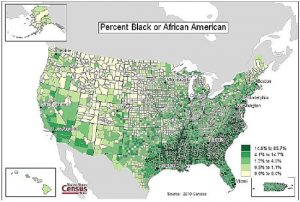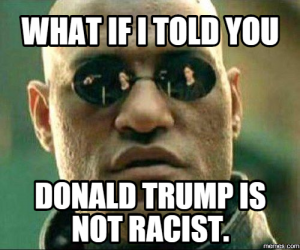With racism being again used as a political tool on both sides, a new storm of controversy has emerged as Channel 4 News reports that recently uncovered documents from the Trump 2016 election campaign show that Trump largely ignored and wanted to dissuade African Americans from voting.
Channel 4 News has exclusively obtained a vast cache of data used by Donald Trump’s 2016 presidential campaign on almost 200 million American voters.
It reveals that 3.5 million Black Americans were categorised by Donald Trump’s campaign as ‘Deterrence’ – voters they wanted to stay home on election day.
Tonight, civil rights campaigners said the evidence amounted to a new form of voter “suppression” and called on Facebook to disclose ads and targeting information that has never been made public.
The ‘Deterrence’ project can be revealed after Channel 4 News obtained the database used by Trump’s digital campaign team – credited with helping deliver his shock victory to become president four years ago.
Vast in scale, it contains details on almost 200 million Americans, among more than 5,000 files, which together amass almost 5 terabytes of data – making it one of the biggest leaks in history.
It reveals not only the huge amounts of data held on every individual voter, but how that data was used and manipulated by models and algorithms.
In 16 key battleground states, millions of Americans were separated by an algorithm into one of eight categories, also described as ‘audiences’, so they could then be targeted with tailored ads on Facebook and other platforms.
One of the categories was named ‘Deterrence’, which was later described publicly by Trump’s chief data scientist as containing people that the campaign “hope don’t show up to vote”.
Analysis by Channel 4 News shows Black Americans – historically a community targeted with voter suppression tactics – were disproportionately marked ‘Deterrence’ by the 2016 campaign.
In total, 3.5 million Black Americans were marked ‘Deterrence’.
In Georgia, despite Black people constituting 32% of the population, they made up 61% of the ‘Deterrence’ category. In North Carolina, Black people are 22% of the population but were 46% of ‘Deterrence’. In Wisconsin, Black people constitute just 5.4% of the population but made up 17% of ‘Deterrence’. (source)
This story raises an interesting question- how important is the Black demographic bloc- what I will refer to as the Black bloc -to winning an election?
As I have noted before, and many others too, politics often takes on a tribalistic quality that results in whole groups of people voting in particular patterns. In the US, a particularly unique case is the Black bloc, which since the late 1960s has voted Democrat for decades at rates of over 90%. The reason for this is, arguably, racial and even according to some people, enforced within many Black communities, where “Democrat” is synonymous with supporting “one’s own”.
I have noted this point before- with the Black bloc consistently supporting Democrats in voter turnouts over 90%, there is no reason for either political party to care for their needs because the Democrats will assume the votes since practically anybody, as long as he is a Democrat, will be elected, while the Republicans will not, and logically so, spend money trying to convinced a demographic that overwhelmingly does not want to support them to give them support.
Based on this logic alone, the Black bloc has done the most damage to itself, and that it is the interest of the bloc, if it wants to seek its own interests (meant in the best way possible, as every group does this and it is only natural), to stop uniformly supporting Democrat candidates because of mere party affiliation and start making demands or else vote for the other party. If the bloc did this, and even resembled the approximate 70-30 Democrat favor found among the Hispanic bloc, they would receive a lot more attention, and more likely a lot more care about their interests from people in power.
But this is not the case- as long at the “Democrat” label is affixed as tightly as it is, there is no national political party interest in caring about the Black bloc at election time save for select areas in battleground states.
Below is a US Census map of the Black population distribution in the US.

Most Blacks are concentrated in the American southeast for historical reasons. Yet many of these states- Alabama, Arkansas, Louisiana, Mississippi, and South Carolina to name a few -have large and powerful White blocs that overwhelmingly vote Republican. For our purposes, the Black vote in those states is largely irrelevant even though they have high Black populations (such as almost 33% in Mississippi and 25% in Alabama) because while uniform in voting patterns, the surrounding factors in those states make it so the vote of the Black bloc is not sufficient to swing a national election. It is the same effect of how upstate New York state is largely Republican, but due to demographic concentration and the politics of largely New York City, the state is uniformly “blue”, and is also why Texas (not this election, but likely beginning in 2024) is becoming a battleground state from once being a reliable and a solidly “red” state.
Thus what Trump’s campaign said- like Trump or not -is a practical one not rooted in ‘racism’ but political reality. The only areas where the Black bloc matters is in select urban areas or battleground states with a strong Black bloc such as Georgia, Michigan, and North Carolina (as the report itself notes) and since the logical assumption based on past behavior (which is also the best indicator of future trends) is a 90%+ Democrat voter turnout, the most logical strategy would be to, as the internal documents note, deter the bloc from voting as much as possible while encouraging other blocs who either are supporters or who may become supporters to vote.
It is true that racism has been frequently used by the Trump campaign for its benefit, as do many politicians. However, in this particular case, even if racism was a factor, the logic behind the Trump campaign’s approach is not apparently racist but is strongly rooted in sound political realities backed up by years of measurable and publicly available data and experience. As such, there is not enough evidence to attribute this to some form of ‘racism’, and doing such could only be understood as an attempt to attack Trump’s campaign while attempting to ignore or suppress what the same people who study demographics and campaign strategy for the Democrat party know already and have exploited for decades to their benefit.



